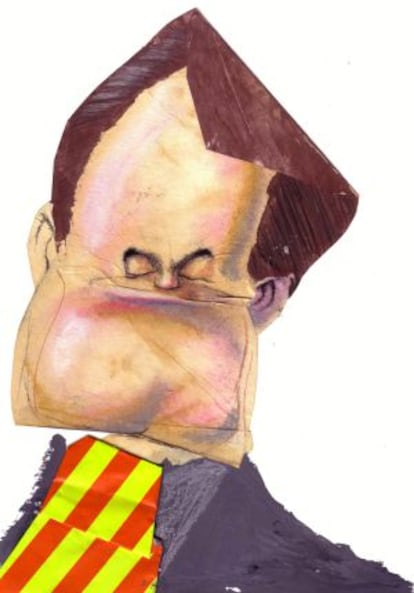The would-be leader of a "nation"
Artur Mas has taken Catalonia's search for identity to a new level The politician has steadily risen through the ranks of CiU

He is cold and distant and he's got nerves of steel. Artur Mas, 56, will go down in history as the first Catalan premier in the history of democratic Spain to ask for "the structures of a state in its own right" for his region, Catalonia.
There was little to suggest such a move by an economics graduate and civil servant with a short pedigree in the nationalist coalition CiU - even after he was personally selected by longtime Catalan and CiU leader Jordi Pujol as his successor in 2000. In fact, Mas' showdown with the Spanish central government following the massive nationalist demonstration of September 11, Catalonia Day, has caught everyone by surprise.
After beginning his public service career in 1982, Mas was successively director general of the Catalan Trade Office ("obviously I'm a technician, not a politician," he once confessed), Barcelona councilor, regional planning commissioner and finance commissioner, with a brief and unsuccessful stint in the private sector (at a furrier).
Obviously I'm a technician, not a politician," Mas once confessed
Prudent and discreet, Mas is not afraid of failure because he knows what it's like: he won regional elections in 2003 and 2006 in terms of seats, not votes, and it was still not enough to become Catalan premier. But this made him a tougher man, and in 2007, before an audience of 3,000 people, he introduced his pro-sovereignty ideas meant as a way forward from the classic "Catalanism" embodied by Jordi Pujol. He called his set of guidelines Casa Común (Common House), and it was then that he began speaking about Catalans' limitless right to decide, although back then he was talking about infrastructure, financial agreements and self-rule. He also talked about overcoming Catalonia's "obsession" with trying to change Spain.
By then, the Estatut, or regional bill of rights and obligations - which was approved by the Catalan assembly, the Spanish Congress and by referendum - had already been under review by the Constitutional Court for a year following a legal challenge by the conservative Popular Party (PP) over several issues, including the use of the term "nation" in the preamble. "The text is untouchable, and if it isn't, then it's not acceptable," warned Mas. "If the text is altered and hits a wall, Catalonia will have to initiate its own transition in favor of the right to choose," he said.
And so it was. The Constitutional Court altered 14 articles in the Estatut in June 2010, and there was a massive demonstration of nationalist sentiment in Barcelona, with people chanting: "We are a nation, we decide." In November of that year, Mas won the regional elections hands down despite having barely made any campaign promises. His one major issue was reaching a new fiscal deal with Madrid, a project that most Catalans could support, even those not in favor of independence.
The text is untouchable, and if it isn't, then it's not acceptable"
His investiture speech focused on a national transition that would begin with negotiations over new fiscal terms -- something that would only make sense if PP leader Mariano Rajoy did not win the November 2011 general elections by an absolute majority. But Rajoy did, and Mas continued to request a new fiscal deal while making spending cuts to try to bring the deficit down, like the rest of the regions. The economic crisis did the rest: Catalan coffers stood empty (regional debt stands at 42 billion euros), the cost-cutting continued, and Catalonia recently announced it would request a regional bailout from Madrid, as Murcia and the Valencia region have done. The nationalist government, however, argues that it is not so much a bailout as a way of getting back its own money, since Catalan leaders have long held that the region contributes more than others to national coffers, and gets little in return.
"Leaders are people who interpret the meaning of every historical moment. It is the government's responsibility not to shut the doors on the desire of a people," said Mas in his investiture speech.
In 2009 he said he was afraid of holding a referendum in case most Catalans expressed a desire to remain in Spain. But perhaps he considers that the time is finally right.
Tu suscripción se está usando en otro dispositivo
¿Quieres añadir otro usuario a tu suscripción?
Si continúas leyendo en este dispositivo, no se podrá leer en el otro.
FlechaTu suscripción se está usando en otro dispositivo y solo puedes acceder a EL PAÍS desde un dispositivo a la vez.
Si quieres compartir tu cuenta, cambia tu suscripción a la modalidad Premium, así podrás añadir otro usuario. Cada uno accederá con su propia cuenta de email, lo que os permitirá personalizar vuestra experiencia en EL PAÍS.
¿Tienes una suscripción de empresa? Accede aquí para contratar más cuentas.
En el caso de no saber quién está usando tu cuenta, te recomendamos cambiar tu contraseña aquí.
Si decides continuar compartiendo tu cuenta, este mensaje se mostrará en tu dispositivo y en el de la otra persona que está usando tu cuenta de forma indefinida, afectando a tu experiencia de lectura. Puedes consultar aquí los términos y condiciones de la suscripción digital.









































